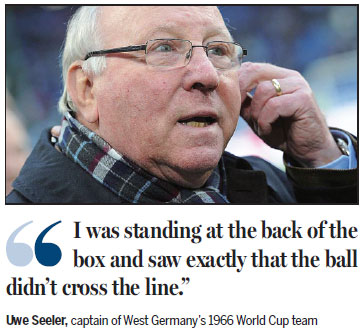Germans still dispute 'the goal that never was'
Fifty years after THAT goal at Wembley, former West Germany captain Uwe Seeler still insists the shot by England's Geoff Hurst never crossed the line in the 1966 World Cup final.
Hurst's second goal in the 101st minute of extra time - which put England ahead 3-2 after the match had finished 2-2 through 90 minutes - is arguably the most controversial goal in international soccer history.
England went on to claim a 4-2 win over West Germany, with Hurst becoming the only player to score a hat-trick in a World Cup final when he added his third goal in the dying seconds of extra time.

But whether or not the ball bounced behind the line from Hurst's shot for England's third goal has been debated for half a century, with Saturday marking the 50th anniversary of the match.
Swiss referee Gottfried Dienst awarded the goal after consulting with his linesman, Tofiq Bahramov, of the then USSR.
Some modern studies, using film analysis and computer simulation, suggest the ball never crossed the line, something Seeler has insisted for five decades.
"I was standing at the back of the box and saw exactly that the ball didn't cross the line," said the 79-year-old Seeler.
Hurst's shot beat West Germany goalkeeper Hans Tilkowski, but the ball hit the underside of the crossbar and bounced on the line before being headed away by defender Wolfgang Weber.
But Dienst's decision has always baffled Seeler.
"We were all in a state of commotion, none of us knew what was going on," he recalled this week.
"No one (on the West Germany team) could understand why the goal was given."
While the 1966 final remains England's only World Cup triumph, the Germans' victory at the 2014 Brazil finals was their fourth world title and Seeler says it is time to put the 1966 controversy behind them.
"I believe all the players have now well digested the events," he said.
"Even if it was a defining moment, sport is sometimes like that. You have to absorb it and put it away."
Up until his death in 1998, Dienst admitted he had no idea whether the ball ever fully crossed the line and, in his autobiography 1966 And All That, even Hurst has said the Germans were probably right.
Seeler said they joked about the incident whenever he met members of England's 1966 side.
"When Geoff or Bobby (Moore) or Jackie (Charlton) were here, we'd have a laugh together about it," said Seeler.
"They knew alright that the goal wasn't one, that the ball wasn't in. They saw it."
And Seeler said he is pleased goal-line technology in the modern game means there will be no such repeat of the events 50 years ago.
"Today football has become pure business," he said. "So it's necessary to take certain measures to prevent such decisions.
"Of course, there are mistakes from time to time, but that's just part of football."
The match and THAT goal is the subject of a special exhibition at the German Football Museum in Dortmund under the title "50 Years After Wembley - the myths in snapshots" which runs until Jan 15.
(China Daily 07/30/2016 page11)














